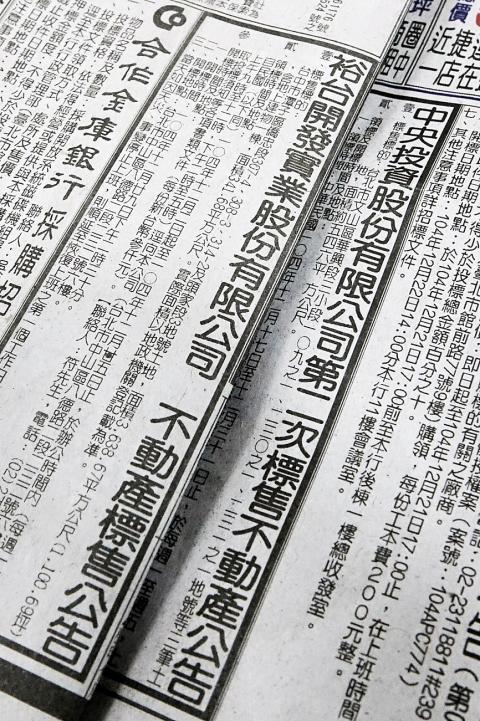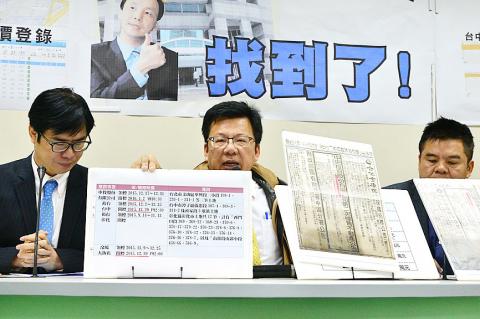The Democratic Progressive Party (DPP) caucus yesterday said that it suspects the Chinese Nationalist Party (KMT) is trying to sell its party assets before an anticipated Presidential Office handover to the DPP next year.
The DPP caucus told a news conference in Taipei that the Chinese-language Commercial Times has been publishing advertisements calling for buyers for 26 plots owned by the KMT — three in Taipei, six in Taichung and 17 in Changhua — and for 80 percent of the shares of a hotel in Palau.
“The contact address for all of these advertisements points to the KMT headquarters on Bade Road in Taipei,” DPP Legislator Lee Chun-yi (李俊俋) said.

Photo: Lu Chun-wei, Taipei Times
Lee questioned whether the KMT is trying to sell out its party assets in different batches in order to avoid possible calls for the recovery of funds following the potential change to the nation’s governing party next year.
DPP Legislator Chuang Ruei-hsiung (莊瑞雄) said that according to the information made available by the land plots’ price registration system, the money that could be amassed by the sale of the plots and the hotel shares could total more than NT$1.4 billion (US$42.27 million).
DPP Legislator Chen Chi-mai (陳其邁) asked whether KMT Chairman Eric Chu (朱立倫) is selling the party assets to raise the funds needed to cover the party’s election expenses, “probably including vote-buying.”

Photo: Wang Yi-sung, Taipei Times
“Chu is the commander-in-chief of land speculation, with his party’s sales of plots of valued land,” Chen said.
Buyers are advised against purchasing these plots at a low price, as they are ill-gotten gains, DPP Legislator Yeh Yi-jin (葉宜津) said.
She also questioned why an affidavit of confidentiality needs to be signed when making bids for the party’s assets, as the party has demanded.
Former DPP spokesperson Hsu Chia-ching (徐佳青) said that she has been collecting information about the asset sales for a while, stressing that she first noticed an advertisement in the Commercial Times last month calling for buyers for a hotel in Palau, and last week noticed plots for sale in Tanzih (潭子), Taichung, and Wenshan (文山), Taipei, “the ads of which were only a day apart.”
“And two months ago I found out that the KMT was selling land in Changhua, totaling about 7,400 ping (2.446 hectares), which had been leased to RT-Mart, but has recently been taken back for sale,” Hsu said.
The contact address for the four ads is the KMT’s central headquarters and the contact number is the KMT’s number with various extensions, she said.
Hsu also pointed out that the KMT has established two foundations recently.
“Compounding the land sales, it makes one wonder what the KMT is up to,” she said.

US President Donald Trump yesterday announced sweeping "reciprocal tariffs" on US trading partners, including a 32 percent tax on goods from Taiwan that is set to take effect on Wednesday. At a Rose Garden event, Trump declared a 10 percent baseline tax on imports from all countries, with the White House saying it would take effect on Saturday. Countries with larger trade surpluses with the US would face higher duties beginning on Wednesday, including Taiwan (32 percent), China (34 percent), Japan (24 percent), South Korea (25 percent), Vietnam (46 percent) and Thailand (36 percent). Canada and Mexico, the two largest US trading

AIR SUPPORT: The Ministry of National Defense thanked the US for the delivery, adding that it was an indicator of the White House’s commitment to the Taiwan Relations Act Deputy Minister of National Defense Po Horng-huei (柏鴻輝) and Representative to the US Alexander Yui on Friday attended a delivery ceremony for the first of Taiwan’s long-awaited 66 F-16C/D Block 70 jets at a Lockheed Martin Corp factory in Greenville, South Carolina. “We are so proud to be the global home of the F-16 and to support Taiwan’s air defense capabilities,” US Representative William Timmons wrote on X, alongside a photograph of Taiwanese and US officials at the event. The F-16C/D Block 70 jets Taiwan ordered have the same capabilities as aircraft that had been upgraded to F-16Vs. The batch of Lockheed Martin

GRIDLOCK: The National Fire Agency’s Special Search and Rescue team is on standby to travel to the countries to help out with the rescue effort A powerful earthquake rocked Myanmar and neighboring Thailand yesterday, killing at least three people in Bangkok and burying dozens when a high-rise building under construction collapsed. Footage shared on social media from Myanmar’s second-largest city showed widespread destruction, raising fears that many were trapped under the rubble or killed. The magnitude 7.7 earthquake, with an epicenter near Mandalay in Myanmar, struck at midday and was followed by a strong magnitude 6.4 aftershock. The extent of death, injury and destruction — especially in Myanmar, which is embroiled in a civil war and where information is tightly controlled at the best of times —

China's military today said it began joint army, navy and rocket force exercises around Taiwan to "serve as a stern warning and powerful deterrent against Taiwanese independence," calling President William Lai (賴清德) a "parasite." The exercises come after Lai called Beijing a "foreign hostile force" last month. More than 10 Chinese military ships approached close to Taiwan's 24 nautical mile (44.4km) contiguous zone this morning and Taiwan sent its own warships to respond, two senior Taiwanese officials said. Taiwan has not yet detected any live fire by the Chinese military so far, one of the officials said. The drills took place after US Secretary